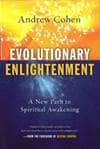
Read Part One of Andrew Cohen's series: Trust: Love's Sweetest Gift
Have you ever considered for yourself what love actually is? Or do you assume you knowwhat love is, based on what others may have said about this all-important topic? Because I’m a spiritual teacher, I’m asked about love all the time, and what I always find interesting is that people use the same word to mean so many different things. One thing I can say for sure is that we tend to use the word love for that which we feel strongly about. But we use it both to refer to personal preferences and to point to that which we consider to be the most meaningful in human experience.
Speaking personally, for example, I can honestly say: I love coffee. I love Chinese food. I really love corn on the cob. I love my new hybrid car. I love New York City, my place of birth. I love India, that land of magic and mystery. I love the Berkshire Mountains in Western Massachusetts where I live, especially in the fall when the leaves turn incandescent gold, orange, purple, and red. I love to travel and experience the freshness of impermanence and the freedom of movement. I love surrendering to overwhelming exhaustion and falling into deep sleep after returning home from long plane flights. I love my little dog and being woken up in the morning by his insistent affectionate kisses. I love my wife of 26 years and the deep trust born over time that we share. I love the powerful memory of my first serious romance when I was 16 years old. I love music. I love jazz and fusion and blues. I love to play the drums.
I love my students from all over the world, with whom I share a passion for the evolution of consciousness that enlivens, empowers, and inspires us all. I love Spirit, because I discovered its ungraspable nature to be my own True Face, the source of my freedom and all that I do. I love my Teacher, because he gave me everything. I love to teach, because it is then that I am most free. I love the life that I live, because I have been given an opportunity to make a contribution to the evolution of consciousness and culture.
So when we use the word “love,” what exactly are we talking about? Are we referring to our unique tastes and preferences? Are we referring to our experience of deep personal bonds and emotional attachments? Or are we referring to our connection to a higher spiritual Truth? Maybe we are referring to all three. These are distinctions that are not often made clearly enough.
Love is commonly described as that unique human experience that gives the rest of life meaning and purpose. Without it, we are told,life is meaningless. I also believe this to be true. But when we refer to that which gives us an ultimate sense of purpose, are we pointing to an experience of love that transcends the normal boundaries of our personal identity, or one that, as powerful as it may be, is still trapped within it?
When I was 16 years old, I had two of the most powerful experiences of love I believe a human being can have. One night, I was sitting up late having a conversation, and for no particular reason the doors of perception opened wide. Suddenly it appeared that the whole universe was my own body and my mind had become infinite and all encompassing. The presence of love that accompanied this visitation from the unknown was so intense that I felt that my body would not be able to bear its intensity for more than a few moments. It soon passed, but left an indelible impression on my soul. Later that same year, I fell deeply and madly in love with a woman for the first time in my life. It was a romantic interlude complete with all the agony and ecstasy of the great classic love stories. While it was an experience that I’ll never forget and was never able to repeat, it didn’t ultimately change my life. My visitation from the unknown, on the other hand, changed my life forever.
In order to have a profound and multidimensional appreciation of what love is, we need to be able to see its various forms and expressions within a hierarchy of values. A life-transforming experience of spiritual love, I believe, is the highest form of love,because within it, we glimpse eternity—a vision of that which transcends all of the preferences and attachments of our personal identity.
I still very much love coffee, walking my dog, playing the drums, travelling with my wife, and meeting and spending time with students and colleagues who share my passion for the evolution of consciousness. We should all aspire to know what love is in its many multifaceted manifestations. But while striving to embrace the full spectrum of the human experience, we want to do so within a hierarchy of spiritually informed values—values that always make it clear what is more important than anything else.
Read Part Three of Andrew Cohen's series: God Is Love


